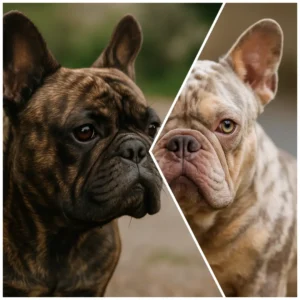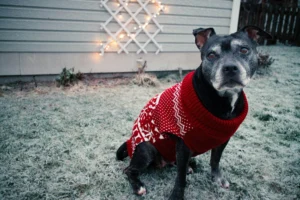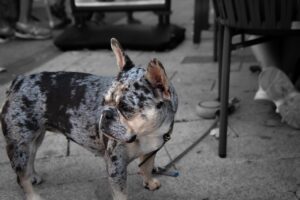Last updated: September 14, 2025
Quick Answer
Cream French Bulldogs look pale “eggshell” or near-white with a very even coat. Fawn Frenchies range from light tan to red-fawn and often shows a darker facial mask. To tell them apart, compare overall shade, check nose and eye-rim pigment, and note whether a mask is present—ideally in clear daylight photos.
TL;DR
- Visual markers: Cream Frenchie = uniform pale/eggshell; Fawn Frenchie = tan → red-fawn and mask commonly seen.
- Registry acceptance: The AKC standard lists cream and fawn; the Kennel Club (UK) resgisters fawn and describes cream/red shades as less desirable; the FCI standard recognizes fawn (with/without brindle/white).
- Quick ID tips: Use daylight on a neutral background, then check pigment (nose/eye rims) and look for a black mask.
Visual ID Guide
Shade, pigment, and mask
- Cream: Very pale, almost “off-white,” and usually uniform from head to tail. Pigment on the nose and eye rims can be lighter in some dogs; conformation preferences vary by registry wording.
- Fawn: A tan through red-fawn spectrum. Many fawn Frenchies show a darker facial mask and darker nose/eye-rim pigment than cream. Coat may look slightly warmer or “sandier” next to a cream dog.

Photo ID Tips (checklist)
- ☐ Lighting: Take photos in bright daylight (indirect sun) to avoid yellow indoor casts.
- ☐ Background: Use a neutral grey/white backdrop so the camera’s auto-balance doesn’t shift the coat’s tone.
- ☐ Angles: Capture full-body, head-on, and close-ups of nose and eye rims to document pigment and any mask.
- ☐ Consistency: Compare several photos taken minutes apart to confirm the shade is truly pale (cream) or tan/red-tinged (fawn).
- ☐ Side-by-side: If possible, place the dog next to a known cream/fawn reference photo for easier visual comparison.
Standards Snapshot
- AKC (United States). The official breed standard explicitly lists cream and fawn (light to red-fawn) among acceptable colors and outlines disqualifying, non-standard colors. See the AKC French Bulldog Standard (PDF).
- The Kennel Club (United Kingdom). The KC standard lists Fawn (plus Brindle and Pied) and notes cream/red shades less desirable within the fawn category. See the KC French Bulldog Standard.
- FCI (International). The international standard describes color as fawn (light to dark), brindled or not, with or without white spotting; it specifies a black nose. See the FCI Standard No. 101 (PDF).
- CKC (Canada) — helpful extra registry. The CKC standard (PDF) includes fawn, cream, white, fawn brindle, and pied, offering plain-English color descriptions.
Registry wording at a glance
| Registry | Accepted wording (color) | Notes |
|---|---|---|
| AKC | White, cream, fawn (light → red-fawn) and combinations | Disqualifies non-standard colors; see AKC PDF |
| KC-UK | Fawn, Brindle, Pied | Cream/red shades within fawn are less desirable |
| FCI | Fawn (± brindle) with/without white spotting | Specifies black nose; does not list “cream” separately |
| CKC | Fawn, cream, white, fawn brindle, pied | Gives straightforward definitions of color terms |
Tip: The terminology used in the show ring is meant to assess conformation, not everyday functionality. Even a “less ideal” color can still be a great companion.
Genetics
Think of dog coat color as two paint families that can mix and layer. One gene, MC1R (often called the E-locus), influences a red/cream spectrum that can appear very pale (cream) in some dogs. Another gene, ASIP (agouti), helps distribute tan/fawn shading (and interacts with other genes to shape things like masks and overlays). For a short, accessible explainer, see the UC Davis Veterinary Genetics Laboratory overview.
Note: This section is purely informational; no breeding or health advice is provided.

Myths & Mislabels
- “Rare color” hype. If a post shouts “RARE,” take a breath. What counts in the show ring is set by the registries, not social media. A trendy label doesn’t change the written standards. When in doubt, peek at the wording from AKC, The Kennel Club (UK), and FCI.
- “Cream is the same as white.” Not quite. Cream can look nearly white in bright sun, but it’s still a very pale shade—with a hint of warmth—that registries describe differently from true white. Side-by-side photos and the official text help make the difference clear.
- “A dark mask means fawn.” A mask often shows up on fawn dogs, but it isn’t a guarantee. Color calls should look at the whole picture: body shade, presence of a mask, and pigment on the nose and eye rims.
Buying & Adoption Tips (paperwork-first, non-medical)
- Match words to paperwork. When color accuracy matters, verify that the registration document uses the same wording as the registry’s current standard. This avoids misunderstandings and helps future owners navigate shows or club events.
- Ask for the basics. Request pedigree documentation and any registration numbers. For U.S. readers, the French Bull Dog Club of America links directly to standard language and offers club context.
- Use official directories. Start with registry or breed-club resources rather than third-party listings. For example: AKC breed page, KC breeds A–Z, or national breed-club sites.
- Avoid color-only decisions. Color is cosmetic. Focus on temperament, suitability for your home, and the breeder or rescue’s transparency and after-adoption support.
Light Care Basics (non-medical)
Grooming & comfort. The breed’s short, smooth coat responds well to quick weekly brushing and occasional tidy-ups. Wipe down after dusty play sessions and keep the living environment cool and well-ventilated.
For health concerns, consult your veterinarian.
FAQs
What’s the single best photo angle to judge color?
Start with a daylight full-body photo on a neutral background, then add close-ups of the nose and eye rims to document pigment. A final head-on shot helps confirm whether a mask is present.
Is “cream” recognized across all registries?
Not identically. The AKC and CKC explicitly list cream, the KC-UK groups it under fawn and calls cream/red shades less desirable, and the FCI uses the broader term fawn with notes on brindle/white.
Why do creams sometimes look white in pictures?
Indoor bulbs and phone auto-balance can wash out pale coats. That’s why daylight and a neutral backdrop make such a difference—cream typically reveals a subtle, warm tone next to true white.
Does a dark mask always mean the dog is fawn?
A dark mask is common in fawn Frenchies, but color calls should consider the overall coat shade and pigment details as well, not the mask alone.
Where can someone check color terms before buying?
Go straight to the standards: the AKC PDF, the KC-UK page, and the FCI standard. For Canada, see the CKC standard.
Is temperament different between cream and fawn?
Coat color doesn’t dictate a dog’s personality, so you won’t see a consistent temperament difference between cream‑ and fawn‑coated dogs of the same breed. Temperament is shaped by genetics, early socialization, training, and the individual’s environment rather than its hue. The AKC breed page offers a helpful, non-medical snapshot.
Key Takeaways
- Cream vs fawn is a color distinction, not a measure of quality or suitability.
- Registry wording matters: AKC lists cream and fawn; KC-UK calls cream/red shades “less desirable” within fawn; FCI uses “fawn” broadly.
- Trust good photos: Daylight, neutral background, and pigment close-ups make the call clearer.
- Choose responsibly: Paperwork first, registries and breed clubs for guidance, and avoid price or “rare color” hype.
Sources used
- American Kennel Club. French Bulldog Breed Standard (PDF). https://images.akc.org/pdf/breeds/standards/French_Bulldog-6-18.pdf
- The Kennel Club (UK). French Bulldog — Breed Standard. https://www.thekennelclub.org.uk/breed-standards/utility/french-bulldog/
- Fédération Cynologique Internationale. FCI Standard No. 101 — French Bulldog (PDF). https://www.fci.be/Nomenclature/Standards/101g09-en.pdf
- Canadian Kennel Club. French Bulldog — Breed Standard (PDF). https://www.ckc.ca/CanadianKennelClub/media/Breed-Standards/Group%206/French-Bulldog.pdf
- French Bull Dog Club of America. Breed Standard (parent club). https://frenchbulldogclub.org/breedstandard/
- UC Davis Veterinary Genetics Laboratory. Dog Coat Color & Type (overview). https://vgl.ucdavis.edu/resources/dog-coat-color
Scope note: This article is general-information only and avoids medical or pricing claims.



